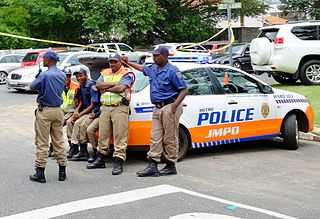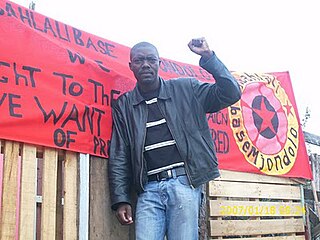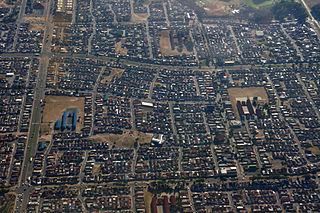
A Judenrat was a World War II Jewish-German-collaborative administrative agency imposed by Germany, principally within the ghettos of occupied Europe, including those of German-occupied Poland. The German administration required Jews to form a Judenrat in every community across the occupied territories.
The Gustafsen Lake standoff was a confrontation between the Royal Canadian Mounted Police (RCMP) and the Ts'peten Defenders in the interior of British Columbia, Canada, at Gustafsen Lake.

Central Kalahari Game Reserve is an extensive national park in the Kalahari desert of Botswana. Established in 1961 it covers an area of 52,800 square kilometres (20,400 sq mi), making it the second largest game reserve in the world.

Abahlali baseMjondolo, also known as AbM, is a shack-dwellers' movement in South Africa well known for its campaigning against evictions and for public housing.The movement grew out of a road blockade organised from the Kennedy Road shack settlement in the city of Durban in early 2005 and now also operates in the cities of Pietermaritzburg and in Cape Town. It is the largest shack dweller's organisation in South Africa and campaigns to improve the living conditions of poor people and to democratise society from below.

Law enforcement in South Africa is primarily the responsibility of the South African Police Service (SAPS), South Africa's national police force. SAPS is responsible for investigating crime and security throughout the country. The "national police force is crucial for the safety of South Africa's citizens" and was established in accordance with the provisions of Section 205 of the Constitution of South Africa.

The Western Cape Anti-Eviction Campaign is a non-racial popular movement made up of poor and oppressed communities in Cape Town, South Africa. It was formed in November 2000 with the aim of fighting evictions, water cut-offs and poor health services, obtaining free electricity, securing decent housing, and opposing police brutality.
The N2 Gateway Occupations saw large numbers of government-built houses occupied illegally by local residents of Delft in the Western Cape during December, 2007. The houses in question were the new Breaking New Ground (BNG) houses in the Symphony section of Delft near the main road Symphony Way. This was the largest occupation of houses in South Africa's history.
No Land! No House! No Vote! is the name of a campaign by a number of poor people's movements in South Africa that calls for the boycotting of the vote and a general rejection of party politics and vote banking. The name is meant to imply that if government does not deliver on issues important to affected communities these movements will not vote.
The squatter's movement Abahlali baseMjondolo occupied a piece of vacant state owned land in Macassar Village, near Somerset West outside of Cape Town on 18 May 2009. The occupation was later destroyed by the city's anti-land invasion unit.

Mzonke Poni is an activist in Cape Town. He is the former chairperson of Abahlali baseMjondolo of the Western Cape and was previously a leader of the Western Cape Anti-Eviction Campaign. The Sunday Times has described him as "the face of an ANC nightmare - an angry activist mobilising the township masses to protest at what he calls the government's failure to create a better life for the poor."
South Africa has been dubbed "the protest capital of the world", with one of the highest rates of public protests in the world.
The Mandela Park Backyarders or just Backyarders is an unfunded Khayelitsha-based South African social movement made up of poor and marginalised residents of Mandela Park that is working for housing rights and against evictions.

The 2011 occupation of Hetherington House at University of Glasgow, Glasgow, Scotland, was a student, staff and community occupation. It commenced 1 February 2011, ending 31 August 2011, becoming one of the longest-running student occupations in the context of the wider movement of student protests in the UK in 2010, early 2011, and 2011 United Kingdom anti-austerity protests.
The Commissioner Government or Commissar Government, was a short-lived Serbian collaborationist puppet government established in the German occupied territory of Serbia within the Axis-partitioned Kingdom of Yugoslavia during World War II. It operated from 30 April to 29 August 1941, and was headed by Milan Aćimović. Of the ten commissioners, four had previously been ministers in various Yugoslav governments, and two had been assistant ministers. The members were pro-German, anti-Semitic and anti-communist, and believed that Germany would win the war. The Aćimović government lacked any semblance of power, and was merely an instrument of the German occupation regime, carrying out its orders within the occupied territory. Under the overall control of the German Military Commander in Serbia, supervision of its day-to-day operations was the responsibility of the chief of the German administrative staff, SS-Brigadeführer and State Councillor, Harald Turner. One of its early tasks was the implementation of German orders regarding the registration of Jews and Romani people living in the territory, and the placing of severe restrictions on their liberty.

The following is a timeline of the Bahraini uprising from February to March 2011, beginning with the start of protests on February 2011 and including the Saudi-backed crackdown from 15 March.

In March 2013 around a thousand people occupied a piece of land in Cato Crest, Durban and named it Marikana after the Marikana miners' strike. Mayor James Nxumulo blamed the occupation on migrants from the Eastern Cape. He was strongly criticised for this by the shack dwellers' movement Abahlali baseMjondolo who said that "The City Hall is red with blood".
On 27 April 2013, the national public holiday of Freedom Day in South Africa which some grassroots social movements have termed UnFreedom Day, members of Abahlali baseMjondolo occupied a piece of land in Philippi, Cape Town. They named the occupation Marikana after the Marikana miners' strike. The occupation was repeatedly destroyed by the city's anti-land invasion unit. According to the Daily Maverick the occupiers were evicted on six separate occasions. Two months after the eviction 90 people were still sleeping on the site under a tent.
This page is based on this
Wikipedia article Text is available under the
CC BY-SA 4.0 license; additional terms may apply.
Images, videos and audio are available under their respective licenses.











